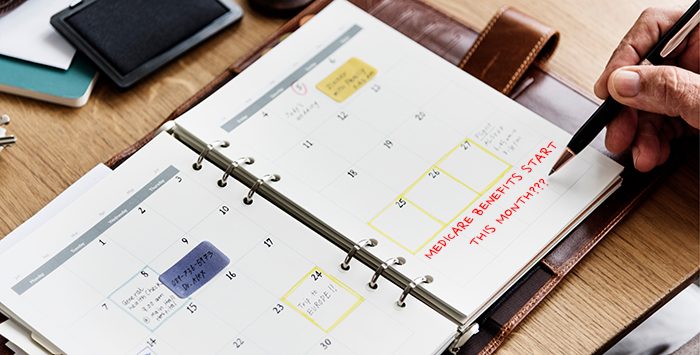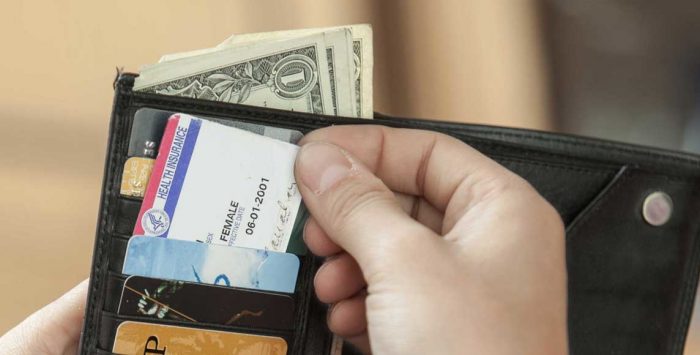

Your Medicare card is proof that you’re entitled to health benefits under Medicare. Here, we’ll tell you everything you need to know about this important piece of paper.
Medicare eligibility begins for most people at age 65. If you’re collecting Social Security benefits beforehand (which you can do starting as early as age 62), you’ll be automatically signed up for Medicare Part A, and you should receive your Medicare card in the mail about three months before your 65th birthday.
If you qualify for Medicare because of a disability, you’ll get your card in the mail about three months before your 25th month of receiving Social Security Disability Insurance (SSDI) benefits (if you qualify due to ALS or end-stage renal disease (ESRD), you do not have to wait two years for Medicare to begin).
If you need to sign up for Medicare yourself (which you’ll do through the Social Security Administration) as opposed to being automatically enrolled, you’ll generally get your card in the mail within 30 days of enrolling.
If you don’t receive your Medicare card, contact Social Security at 1-800-772-1213. You can also log onto your Social Security account and make sure the mailing address on file is correct.
Your Medicare card is red, white, and blue, and it contains your name and your Medicare ID number. Note that your card will not contain your or your spouse’s Social Security Number. This change was implemented in 2018 and 2019, when new cards and ID numbers were issued to all beneficiaries, to help keep Social Security numbers private.
Your Medicare card will indicate whether you have Medicare Part A, Medicare Part B, or both. Finally, your Medicare card will note the date when your health coverage began. You may be surprised to see that your Medicare card is paper, not plastic. Paper cards are easier for providers to copy, which is why Medicare made the switch. (If someone offers you a plastic Medicare card, it’s a scam.)
Yes, the government recommends that you should carry your Medicare card with you when you’re away from home, as you will need it if and when you need to obtain medical care, including inpatient or outpatient care.
You’ll use your Original Medicare card to fill prescriptions only if they are covered by Medicare Part B (examples include drugs that are administered in a doctor’s office via an infusion). In all other cases, you’ll use your Part D prescription drug plan when filling prescriptions. (Medicare Advantage plans often include Part D drug coverage, in which case you’ll use your Advantage plan’s card to fill prescriptions.)
You should not share that card with anyone in a non-medical capacity. For example, your bank does not need a copy of your Medicare card. Remember, even though Medicare cards no longer list Social Security numbers, they still contain personal information, like your unique Medicare ID number, so be careful about who sees that card. Keep in mind that Medicare will not call you over the phone asking you to confirm your personal ID number. If someone calls asking for that, assume it’s a scam.
Your Medicare card will not indicate whether you have Medicare Advantage, a Medicare Part D drug plan, or supplemental insurance (such as a Medigap plan). Generally, you’ll get a separate card from your plan administrator for each of these plans. If you have Medicare Advantage or Medigap, it’s a good idea to also carry those cards with you when seeing providers in addition to your regular Medicare card, and you’ll need your Part D or Medicare Advantage card when you fill prescriptions at the pharmacy.
You can order a replacement Medicare card, or print a new one yourself, by logging into your Medicare account. Or you can call 1-800-MEDICARE to request that a new card be sent to you. If you need in-person assistance, you can visit your local Social Security office and request a replacement Medicare card.
Medicare Advantage, Part D, and Medigap plans are issued by private insurers and come with their own insurance cards. Contact your insurer directly if you need to replace one of these cards.
Maurie Backman has been writing professionally for well over a decade, and her coverage area runs the gamut from healthcare to personal finance to career advice. Much of her writing these days revolves around retirement and its various components and challenges, including healthcare, Medicare, Social Security, and money management.

Today medicareresources.org released tips to help consumers avoid costly mistakes while evaluating and selecting coverage during Medicare open enrollment.

Medicare beneficiaries need to know when their plan will be effective so they can avoid coverage gaps that could leave them without access to care they need.

Our 2023 Medicare Open Enrollment Guide will walk you through sign-up dates, tips for choosing a plan, and more. Get the information you need today!

Q: Will my doctors accept my Medicare card? A: Q: Will all doctors accept my Medicare coverage? A: The answer depends on what type of Medicare coverage you have, and whether you’re already a current patient.

Medicare beneficiaries can call an easy-to-remember toll-free number – 1-800-MEDICARE – for information that includes specific billing questions and questions about claims.

You can usually address many Medicare Advantage or Part D enrollment issues by contacting Social Security or 1-800-MEDICARE. But you have to appeal coverage denials directly to your insurer.

Today medicareresources.org released tips to help consumers avoid costly mistakes while evaluating and selecting coverage during Medicare open enrollment.

Medicare beneficiaries need to know when their plan will be effective so they can avoid coverage gaps that could leave them without access to care they need.

Our 2023 Medicare Open Enrollment Guide will walk you through sign-up dates, tips for choosing a plan, and more. Get the information you need today!

Q: Will my doctors accept my Medicare card? A: Q: Will all doctors accept my Medicare coverage? A: The answer depends on what type of Medicare coverage you have, and whether you’re already a current patient.

Medicare beneficiaries can call an easy-to-remember toll-free number – 1-800-MEDICARE – for information that includes specific billing questions and questions about claims.

You can usually address many Medicare Advantage or Part D enrollment issues by contacting Social Security or 1-800-MEDICARE. But you have to appeal coverage denials directly to your insurer.